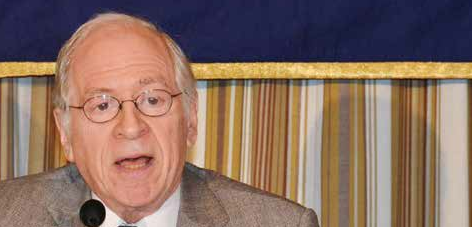Issue:

On the day after the election, the Columbia U. professor offered his assessment of what lies ahead for the Abe administration and the nation.
AS ALL THE POLLS had indicated in the run up to election day on Dec. 14, Prime Minister Shinzo Abe secured a second consecutive landslide victory and more than enough dominance of the domestic political scene to push ahead with his pet policies and projects.
But if the outcome of a vote in which the Liberal Democratic Party won 290 of the 475 seats in the Lower House of the Diet was predictable, staring into a crystal ball to determine what the prime minister will actually do is a far less exact science. Gerald Curtis, for one, believes that anyone anticipating revolutionary change on the scale of Abe’s most recent two years in office is going to be disappointed.
“The danger is that some on the right will want to find something to be proud of in a period in which there is not a great deal to be proud of”
“Don’t look for bold new economic reforms, for the ‘third arrow’ to be suddenly shot at the bulls eye over the coming six months to a year,” Curtis, the Burgess Professor of political science at Columbia University, said at the FCCJ the day after the election.
“I think what we are going to see is pretty much more of the same,” he said. “There’s a lot in motion and things will continue, but labor market reforms? I don’t see it happening.
“Nuclear?” he added with a shrug. “They’ll get the Sendai plant in Kyushu up and running in the early part of next year, but getting any significant number of nuclear power plants back on-line is not made easier by this election.”
The most significant positive development for the prime minister’s much-hyped Abenomics reforms could actually take place in the United States, Curtis suggested, with Congress approving progress on the Trans-Pacific Partnership free trade agreement. “If you get an agreement on TPP, it will have a huge impact on domestic policy, particularly in the area of agricultural reform,” he said.
The big question in the minds of many overseas onlookers, however, is how Abe uses his new-found power to push the issues that he is really interested in: Revising the Constitution, raising Japan’s profile on the international stage, becoming more of a “normal country” and lifting the restraints on the nation’s military. “We have seen since his Yasukuni visit last December that he has been very careful and very cautious about the language he uses in talking about history,” Curtis said. “The question is, will he revert to the Abe we have seen before?
“We can’t be sure, but I doubt it,” he said. “I think he is pragmatic and understands the high price that is paid by raising these wartime issues and seeming to excuse away Japanese actions.”
But Curtis believes there is reason for concern as we move into 2015, the 70th anniversary of the end of World War II. “This is a time that should be a celebration of the past 70 years of democracy, of peace, of the huge Japanese contribution to the economic development of all of east Asia, of all that Japan has been and all that it rejected of what Japan was before 1945. The danger is that some vocal people on the right will want to find something to be proud of in a period in which there is not a great deal to be proud of, the 1930s and 1940s.”
And while Abe has made strenuous efforts to raise Japan’s international profile, particularly in Asia, where he has already visited every one of the 10 member states of ASEAN, there are still concerns that the prime minister’s revisionist views of history are linked to his vision for Japan’s future. “That is not only a concern for the Chinese and the South Koreans, it’s a big concern in the U.S.,” Curtis said, pointing to a series of articles and editorial in U.S. media the Los Angeles Times, the Washington Post, the New York Times that underline just how seriously the Japanese government has to consider the image it is conveying overseas.
And nothing does more to tarnish Japan’s image in the eyes of the international community than its efforts to explain away the comfort women issue, Curtis believes adding that he gets a lot of “pushback” when he broaches the subject with Japanese audiences, which only makes him more determined to bring it up. “It’s disastrous,” he said. “A good adage in this case is that when you find yourself in a hole, stop digging. Japan shouldn’t get into a deeper hole by defending itself on this issue.
“My point is that the concern about Abe is over his vision of this region and Japan’s role in this region and the world,” Curtis said. “Next year, the 70th anniversary of the end of the war, he will issue his Abe statement,” he added. “That’s the opportunity to explain a vision that is reassuring to the neighbors and the Japanese public, the U.S. and others.
“I don’t think he will change his basic strategy all that much; he has done some positive things in raising Japan’s international profile but we come back again to how history issues hang over Japan like a terrible cloud.”
Julian Ryall is the Japan correspondent for the Daily Telegraph.

